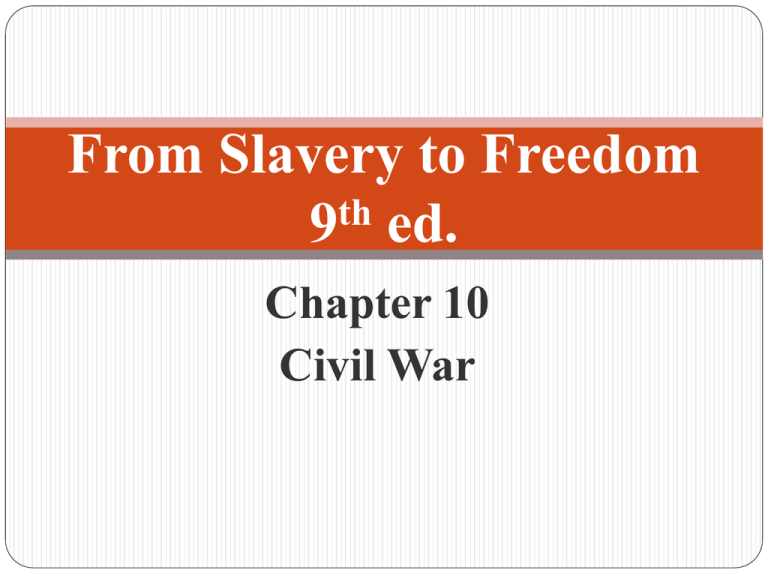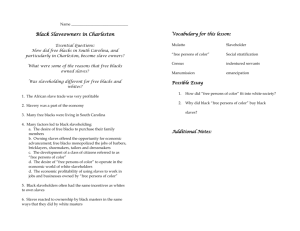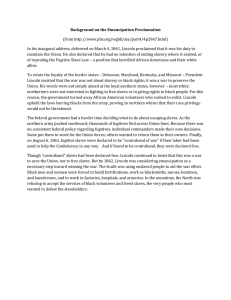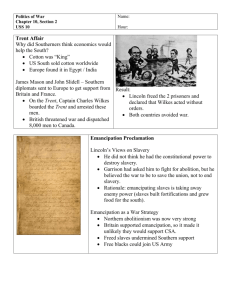
From Slavery to Freedom
th
9 ed.
Chapter 10
Civil War
Inconsistent Federal Policies
Opposition to Lincoln’s Policies
Most people in North supported a war to restore
Union but not a crusade to end slavery
Fear of slave exodus to northern cities and
growing competition for jobs heightened
hostilities between white and black workers
Military draft in 1863 started a four-day riot in
New York City; sight of blacks in army uniforms
inflamed rioters
2
© 2010 The McGraw-Hill Companies, Inc. All Rights Reserved.
Inconsistent Federal Policies
Militant abolitionists critical of Lincoln and
Republican Party for failing to take an
uncompromising stand on slavery
Upset by inconsistent policy towards slaves who
escaped to Union lines in the war’s first year
The Confiscation Acts
Sanctioned Union army’s seizure of rebel
property, including slaves
Lincoln concerned; discouraged declarations of
freedom for fear of losing loyalty of slave-owning
border states
3
© 2010 The McGraw-Hill Companies, Inc. All Rights Reserved.
Group of contrabands at Foller’s
house, Cumberland, Virginia, 1862
4
© 2010 The McGraw-Hill Companies, Inc. All Rights Reserved.
Inconsistent Federal Policies
Lincoln’s Plan
In 1862, Lincoln recommended that U.S.
government cooperate with any state plan that
gradually freed slaves and compensated slave
owners
Recommendation failed; denounced by both sides
Lincoln believed colonization was almost as
important as emancipation
Until end of the war Lincoln hoped at least a portion of
the freed population would be colonized
5
© 2010 The McGraw-Hill Companies, Inc. All Rights Reserved.
Inconsistent Federal Policies
Preliminary Proclamation
Summer of 1862 Lincoln began to consider an
executive order of emancipation of all slaves
Preliminary proclamation issued five days after
the Union victory at Antietam
Revived possibility of compensated emancipation;
continued encouragement of voluntary colonization
Lincoln issued the Emancipation Proclamation
ordering all those held in slavery in rebel states
to be freed from bondage on January 1, 1863
6
© 2010 The McGraw-Hill Companies, Inc. All Rights Reserved.
Inconsistent Federal Policies
General reaction in the North was unfavorable
The Emancipation Proclamation
Freedom did not come swiftly or fully
Only slaves in rebel, not loyal, states freed
Rebel slave owners did not feel duty-bound to
Lincoln’s decree
Many slaves did not know about it for months; some
weren’t freed until war’s end
Proclamation produced confusion in the South
and deprived Confederacy of its labor force
7
© 2010 The McGraw-Hill Companies, Inc. All Rights Reserved.
Emancipation
Proclamation
8
© 2010 The McGraw-Hill Companies, Inc. All Rights Reserved.
Inconsistent Federal Policies
The Thirteenth Amendment
The “Great Emancipator”
Lincoln actively worked with Congress to establish
legislation that abolished slavery
On February 1, 1865, Lincoln signed a Joint
Resolution submitting the proposed Thirteenth
Amendment to the states for ratification
9
© 2010 The McGraw-Hill Companies, Inc. All Rights Reserved.
Aiding the Contrabands
Aiding the Contrabands
Transition from slavery to freedom presented
challenges to both the Union army and the free
but destitute blacks coming over federal lines
General Saxton’s Plan
Abandoned lands to be used for benefit of former
slaves
Led slaves to believe that land would be
available to them as homesteaders
Federal government eventually reclaimed land
10
© 2010 The McGraw-Hill Companies, Inc. All Rights Reserved.
Aiding the Contrabands
Challenges to Effective Relief
Relief difficult because only a small amount of
land that was available for redistribution
Dispute between Treasury and War departments
over who had primary authority to administer
affairs of black people; no coordinated
supervision
Private Relief
Federal relief was so slow that private citizens
sought to provide relief for newly freed blacks
11
© 2010 The McGraw-Hill Companies, Inc. All Rights Reserved.
Aiding the Contrabands
Education
Private ventures to provide black education
began in 1861
Employed many African American teachers
Education for blacks extended to most areas
occupied by Union troops
12
© 2010 The McGraw-Hill Companies, Inc. All Rights Reserved.
Black Troops
Challenges to Black Recruitment
Northern blacks initially rebuffed when trying
to enlist
Fear blacks would claim citizenship; fear of arming
blacks
Abolitionists criticized government’s early
opposition to black soldiers
Lincoln did not seriously consider issue until
the unfavorable course of the war forced him
to revisit it
Did not want to anger border states or alienate North
13
© 2010 The McGraw-Hill Companies, Inc. All Rights Reserved.
Company E, Fourth United States
Colored Infantry
14
© 2010 The McGraw-Hill Companies, Inc. All Rights Reserved.
Black Troops
A Change in Policy
In October 1861, the secretary of war ordered
army to employ fugitive slaves; used for service
roles because leaders refused to arm them
Lincoln forced General David Hunter to disband
First South Carolina Volunteer Regiment that
was made up of former slaves
15
© 2010 The McGraw-Hill Companies, Inc. All Rights Reserved.
Black Troops
The First Black Soldiers
Union’s difficulties and Confederacy’s use of
black labor changed Lincoln’s views on black
enlistment
In August 1862, Lincoln authorized War
Department to reorganize Hunter’s South
Carolina regiment
Black enlistment began to swell
Northern black community leaders and
newspapers championed importance of black
soldiers
16
© 2010 The McGraw-Hill Companies, Inc. All Rights Reserved.
Black Troops
The Success of Black Enlistment
Enlistment of blacks a success; helped to fill
northern states’ draft quotas
Black Officers
Some blacks held Union army commissions
Two regiments of the Corps d’Afrique entirely staffed
by black officers
17
© 2010 The McGraw-Hill Companies, Inc. All Rights Reserved.
Black Troops
Blacks as Spies and Scouts
Blacks helped Union cause with knowledge of
southern terrain; Union relied on information
blacks could get as spies and scouts
Women’s Services
Many women worked in contraband camps,
hospitals, and on naval vessels
18
© 2010 The McGraw-Hill Companies, Inc. All Rights Reserved.
Black Soldiers’ Service
Treatment of Black Prisoners
In 1862, President Davis ordered all slaves
captured in arms to be delivered to home state
and dealt with according to its laws
Lincoln declared that for every Union soldier
killed in violation of law of war a rebel soldier
would be executed, and for every Union soldier
enslaved, a rebel prisoner would be put to hard
labor
Union officials insisted that captured blacks be treated
as prisoners of war
19
© 2010 The McGraw-Hill Companies, Inc. All Rights Reserved.
Black Soldiers’ Service
Captured blacks risked enslavement, more often
killed
Blacks saw action in every theater of the war
More than 38,000 black soldiers lost lives;
mortality 40 percent greater than white troops
Mortality rate explained by excessive fatigue, poor
equipment, bad medical care
Unequal Treatment
Disparity in pay between black and white soldiers
Equal pay given in 1864 after much protest
20
© 2010 The McGraw-Hill Companies, Inc. All Rights Reserved.
Fort Pillow Massacre
21
© 2010 The McGraw-Hill Companies, Inc. All Rights Reserved.
Slave Disruption
Stronger Patrol Laws
Southerners called for closer control of slaves
and strengthening of patrol laws
Many slaves slowly began to understand the
implication of the war on their freedom
“Running the Negroes”
Plantation owners allowed to remove slaves to
safety when an area was threatened with invasion
by federal troops
22
© 2010 The McGraw-Hill Companies, Inc. All Rights Reserved.
Slave Disruption
Insubordination
Slaves became increasingly insolent toward
masters
Slave men gained new roles because of dearth of
white men; gained greater freedom of movement,
allowing them to learn about war’s progress
Fear of Uprisings
White southerners lived in fear of slave uprisings
Slaves both indispensable and subversive to
Confederate war effort
23
© 2010 The McGraw-Hill Companies, Inc. All Rights Reserved.
The Confederate Dilemma
Impressment
In 1863, Confederacy passed a general
impressment law under which slaves could be
seized at a price set by the government
Owners didn’t like policy and neither did slaves
because working for military more arduous work
Enlisting and Arming Blacks
Southern public generally opposed arming blacks
Conscription Act of 1862
Required military service of all Southern white men
except those who could send twenty slaves
24
© 2010 The McGraw-Hill Companies, Inc. All Rights Reserved.
The Confederate Dilemma
Debate over using slaves as soldiers continued in
Confederacy in 1863-64
In 1865, President Davis signed bill authorizing
him to call on each state for a quota of additional
troops, irrespective of color
25
© 2010 The McGraw-Hill Companies, Inc. All Rights Reserved.
Victory
Victory
The Confederate army’s surrender in 1865
brought to an end three centuries of black
enslavement in North America
Forever Free, Edmonia Lewis
26
© 2010 The McGraw-Hill Companies, Inc. All Rights Reserved.






